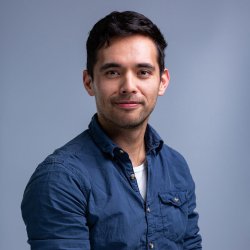Commercialisation Fellow Spotlight - Femi Adeyemi-Ejeye
This year we thought it would be interesting to hear some early first-hand insights into the IAA Commercialisation Fellowship programme and the relationship between Research and Innovation, directly from the Fellows themselves.
Calling Surrey ECRS!
- Are you interested in innovation?
- Are you interested in what the Commercialisation Fellowship can offer you and how it could boost your outputs?
If so, then this could be the right opportunity for you. Contact us at iaa@surrey.ac.uk with ANY questions, and keep an eye out for upcoming opportunities to apply to our Summer 2022 Cohort (April – September)!
... and now let's hear from Femi.
Tell us about yourself, why you applied for this fellowship, and what you expect to gain
In my previous roles, I have been involved in projects up to the level of a prototype implementation, but never the technology transfer into the commercial domain. In 2014, my PhD research led to the live broadcast of the 4K UHD over the internet. In 2017, as a KTP associate I led the design and implementation of a Hybrid (analogue-IP) door entry prototype system.
From July 2021, I will be part of the team responsible for developing a product to mitigate fatality disruptions using 8K UHD video on the railways, as part of a First of a Kind Project. This fellowship is timely, as it will provide me with the opportunity to learn about the technology transfer process and apply it to an ongoing project.
How would you define ‘innovation’, how does it fit within an academic environment, and how is it relevant?
Innovation is the process or application of using an invention, technology, or process in new ways to satisfy a specific need economically. The academic environment is buzzing with new inventions, technologies, and processes. However, skills and greater awareness is needed to fulfil this raw potential through the process of innovation.
What do you think are the biggest barriers to innovation for researchers at Surrey, in particular within your department or faculty, and how do you suggest we address these?
Time: Most academics have teaching, research, and other administrative duties it can be difficult to fit Innovation priming activities.
Know How: Figuring out how to proceed with innovation activities in your area of expertise can be overwhelming. There are several myths about the processes.
Incentive: There seems to be no explicit incentive to engage in innovation activities either through the appraisal/probation or promotion processes.
I think regular departmental workshops can help.
What are you plans over the next 12-18 months and how might this fellowship support those plans?
My confidence in approaching industry seems to improve and this has been because of the mentoring I have received during the fellowship. While I am working in a different area as my field of research, a lot of the knowledge and skills I am learning are easily transferrable to my field.
I intend to approach industry to ask about possible ways we can collaborate and build relationships with industrial partners.
How has the start of your fellowship begun? Who have you met, what projects are you involved with, and what things have you already learned? – was anything unexpected? Did reality meet your expectations?
The start of the fellowship has been very good. I have met with members of the Technology Transfer Office and other Commercialisation Fellows. I am currently working with Dr Andrew Rogoyski from the new and exciting Institute for People-Centred AI on project titled: “Understanding the use of AI in the games industry”. The objective of this project is to understand game development lifecycles and understand where AI techniques can be economically beneficial to these companies. We are in the early stages of the project, but I have learnt how to source for local companies and how to track specific contacts within companies using computer based tools.
If so, how has the fellowship changed your approach to innovation? What are your expectations for the rest of the fellowship e.g. things you’re looking forward to?
Usually, you think of an idea and then do research around it. But now I am beginning to see how ideas can be shaped by potential adopters (industry) and I am looking forward to applying the soft skills I have learnt in future research development.
What would you say to a prospective ECR considering applying to the fellowship?
If you get the opportunity, just do it!
Survey
Question | 😱 | 😵💫 | 😐 | 🤓 | 🔥 |
|---|---|---|---|---|---|
Before your Fellowship, what was your practical understanding and application of impact, knowledge exchange and commercialisation activities? |
|
| ✅ |
|
|
Before your Fellowship, what was your understanding of IP? |
| ✅ |
|
|
|
Before your Fellowship, what was your awareness for the relevance of innovation to the academic career? | ✅ |
|
|
|
|
Before your Fellowship, how confident were you to approach industry with a commercial opportunity and to manage that relationship? | ✅ |
|
|
|
|
Before your Fellowship, what was your awareness of the Innovation Strategy teams and their functions? | ✅ |
|
|
|
|
Overall, how do you feel about Innovation now? |
|
|
| ✅ |
|


